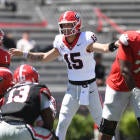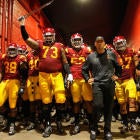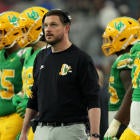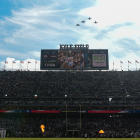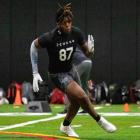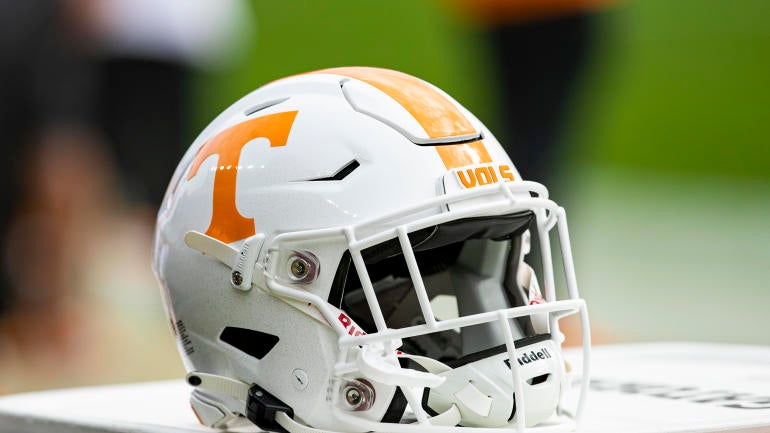
The NCAA is investigating Tennessee for what are believed to be alleged major violations related to NIL dealings across multiple sports, sources confirmed to CBS Sports' Dennis Dodd. The case in football centers around quarterback Nico Iamaleava, who signed a record contract with Spyre Sports Group, Tennessee's primary collective and a member of the The Collective Association, a trade association of 30-plus collectives across the country. TCA has advocated for a revenue-sharing model for athletes that would not require them to become employees.
Tennessee has not received a formal notice of allegations from the NCAA, but it is common in some cases for the governing body to send a draft notice of preliminary violations being investigated.
The NCAA enforcement staff could charge Tennessee with multiple Level I and Level II violations, according to ESPN. This less than a year after the program was hit with 18 high-level violations due to impermissible recruiting practices which occurred under former coach Jeremy Pruitt.
Already having been placed on probation as a result of the findings from that case, Tennessee could be labeled a "repeat violator" in the NCAA's eyes, which would mean enhanced penalties. However, the NCAA only applies the repeat violator label if a school lacks "exemplary cooperation."
The NCAA also has gotten away from handing out postseason bans if they impact current athletes and coaches who have nothing to do with previous cases.
"The NCAA's allegations are factually untrue and procedurally flawed," University of Tennessee chancellor Donde Plowman wrote in a letter to the NCAA obtained by ESPN. "Moreover, it is intellectually dishonest for the NCAA enforcement staff to pursue infractions cases as if student-athletes have no NIL rights and as if institutions all have been functioning post-Alston with a clear and unchanging set of rules and willfully violating them."
Tennessee is taking a clear stance that it did not violate any NIL policies as they were.
"We feel supremely confident and strongly that we have followed all NCAA guidance related to NIL," a person familiar with the Tennessee process told Dodd.
The Volunteers aren't the only prominent program under scrutiny for their NIL practices. The NCAA is investigating Florida's recruitment of former quarterback signee Jaden Rashada, according to multiple reports. Earlier this month the NCAA handed down its most severe NIL-related punishment yet to Florida State after an an assistant coach allegedly facilitated impermissible contact between a booster and a transfer prospect. Among other penalties, the Seminoles received two years of probation and temporary disassociations from a booster and from a collective.
Retroactive enforcement
Since June 2021, the NCAA has changed its NIL policy multiple times, creating a confusing web for compliance departments to untangle. State laws that often preempt new NCAA mandates have further muddied the waters.
The NCAA's initial interim policy put the onus on state laws, stating that athletes could engage in NIL activities that "are consistent with the law of the state where the school is located." It also reiterated that policy "preserves the commitment to avoid pay-for-play and improper inducements."
In April 2022, Tennessee joined a growing list of states to pass resolutions allowing universities to have direct and public relationships with NIL collectives. Among other things, the amendment allowed NIL collectives to talk directly with university representatives, such as coaches, current student athletes and recruits.
Iamaleava initially committed to Tennessee in March 2022. Around the same time, reports surfaced of an an NIL deal worth $8 million. Iamaleava's involvement with such a deal was never confirmed, nor have any details emerged about any NIL deals he signed before or after enrolling at Tennessee.
In May 2022, the NCAA reminded schools that using NIL as a recruiting tool was a strict violation of its policy. It simultaneously promised to retroactively investigate programs and their associated collectives for any potential violations. The NCAA sent out another notice in October that further clarified the interim policy and aligning it with state laws, allowing schools officials to interact with NIL collectives.
The update also narrowed the scope of the NCAA's enforcement policies.
"For any violations that occurred before this additional clarification, the board directed the enforcement staff to review facts of individual cases but pursue only cases that are clearly contrary to the interim policy." the notice reads.
So the issue at hand hinges on whether or not any of Iamaleava's NIL deals clearly violated the NCAA's pay-for-play or inducement policies. Previous NCAA mandates also prevent prospective athletes from interacting directly with boosters -- who can often serve in roles with an NIL collective -- in a recruiting capacity, which is what the NCAA ultimately punished Florida State for.
Tennessee's past with NCAA
Pruitt was fired in 2021 after an internal investigation, conducted by the University of Tennessee, found evidence of recruiting violations. Over a year later -- in the the middle of current coach Josh Heupel's second year at the helm -- the NCAA sent Tennessee a notice of allegations accusing it of, among other things, 18 Level I violations.
Tennessee denied culpability in Pruitt's actions, specifically pushing back against the NCAA's charge that it failed to monitor the football program. It argued that its swift termination of Pruitt and several assistants should offset more severe punitive measures. Tennessee also got help from state attorney general Jonathan Skrmetti who, according to Knox News, argued that a postseason ban would violate an amendment to a Tennessee state law -- attached to the April 2022 NIL resolution -- that protects student athletes from being punished for violations they did not commit.
The posturing worked. Tennessee avoided a postseason ban but was hit with an $8 million fine, scholarship and other reductions to recruiting efforts. The Vols were also forced to vacate wins from the 2019-20 seasons.
Notably, the NCAA lauded Tennessee for its "exemplary cooperation" throughout the investigation and called the university a "model all institutions should strive to follow." Plowman emphasized that fact in her most recent letter to the NCAA.
"As you have seen in our previous dealings with the NCAA, when we are wrong at the University of Tennessee, we admit it," Plowman wrote. "We spent more than $1 million on outside counsel to investigate problems discovered in our football program that were reported to me, personally, and self-reported the entire case to the NCAA... It is inconceivable that our institution's leadership would be cited as an example of exemplary leadership in July 2023, then as a cautionary example of a lack of institutional control only six months later."










